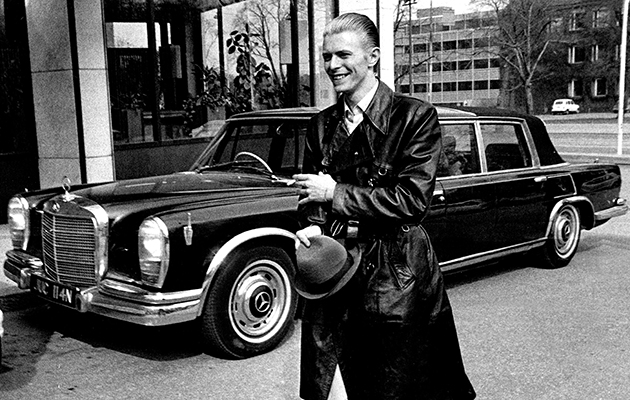But Berlin was also a grand metaphor for Bowie’s towering sense of alienation and schizophrenia in the late ’70s, a vast canvas for the healing psychodrama of Low, “Heroes” and Lodger. Stranded in a bleak interzone between East and West, this fractured cityscape may well have appealed to Bowie’s life-long love of sci-fi. But it was also to become the setting for his most adventurous voyage yet. A descent into his own cracked psyche, an exploration of inner space.
Part One of Bowie and Iggy’s musical rehab was Pop’s The Idiot. Recording began in June at the Château d’Herouville near Paris, soon after the White Light tour ended, with many of the same backing musicians. The duo then briefly relocated to Munich’s Musicland studios, where they met future Bowie collaborator Giorgio Moroder. Finally, the wandering duo settled in Hansa in Berlin.
Iggy trailed The Idiot as a “cross between James Brown and Kraftwerk”, with Bowie producing and playing “Angry Young Guitar”. Featuring brutalist robo-punk workouts like “Nightclubbing”, “Funtime” and the rough blueprint for future Bowie 45 “China Girl”, the LP was a bruising collision of disco and rock, Europe and America. Eno described listening to The Idiot as “like having your head encased in concrete”. He meant it as a compliment.
The Idiot was also a dry run for the radical new sounds on Bowie’s Low, which would turn out less abrasive but no less emotionally intense. Initially christened New Music Night And Day, the LP was renamed to convey the visual pun of its sleeve shot from The Man Who Fell To Earth of Bowie in profile: low profile. Despite being enshrined in rock history as the first of Bowie’s “triptych” of Berlin albums with Eno, Low was almost entirely cut in France, at Château d’Herouville. An opulent mansion hemmed in by high walls and heavy gates, the Château had hosted Bowie’s Pin Ups sessions three years earlier, in happier times.
The musicians on Low were mostly Station To Station and White Light tour veterans – guitarist Carlos Alomar, bass player George Murray, drummer Dennis Davis, and Tony Visconti co-producing with Bowie. Iggy was another fixture at the Château, singing occasional backing vocals and sounding out Gardiner for his own future projects. But the most significant new team member was Eno, who arrived midway through the sessions with subversive strategies and a primitive, joystick-operated synthesiser. Visconti’s then-wife, singer Mary Hopkin, duetted with Eno on the background sighs to Sound And Vision, jokily credited to “Peter and Paul”. Former Beggars Opera guitarist Ricky Gardiner was also recruited on Visconti’s recommendation.
“He was totally left-field and savvy with special effects,” says Visconti. “I was in awe of him.” But Bowie reveals he had other plans for the sessions. “The original top of my wish list for a guitar player on Low was Michael Rother from Neu!,” Bowie says. “Neu! being passionate, even diametrically opposite to Kraftwerk. I phoned Dinger from France in the first few days of recording, but in the most polite and diplomatic fashion he said no.” Despite its incongruous genesis in rural Gallic splendour, Low was emphatically a Berlin album in spirit: a sonic distillation of the city whose isolated state chimed in with Bowie’s ravaged brain in 1976. “That initial period of living in Berlin produced Low,” Bowie revealed in 1977. “It was like, ‘Isn’t it great being on your own? Let’s just pull down the blinds and fuck ’em all’. Berlin has the strange ability to make you write only the important things. Anything else, you don’t mention – and in the end you produce Low.”
The chillingly beautiful instrumental pieces on the album paid explicit homage to Bowie’s new bunker in the East. “Warszawa” caught the bleak mystery of Cold War Poland, but it takes no great leap of faith to draw parallels between the album’s melancholic tone poems and Bowie’s own deep-frozen mental state.


